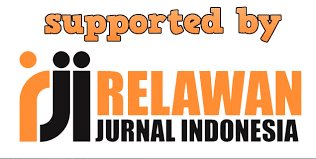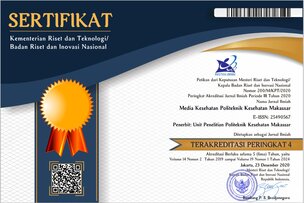DESCRIPTION OF DIETARY HABIT AND ENERGY INTAKE AND NUTRITIONAL STATUS ON ELDERLY
Abstract
Background: Elderly is someone who has reached age of 60 years. At that age there will be setbacks cells that can affect the function and the ability of the body system so that the various problems experienced by the elderly. It had an impact on their lack of food consumption pattern. Conduct of one will be reflected of diet pertaining to consumption food. Objective: to describe the food consumption pattern, energy intake and nutritional status on elderly. Method: This research was conducted in RW 10 Sub Sudiang Biringkanaya District of Makassar. Sampling was done by purposive sampling with criteria for residing permanently, willing to be sampled and active communication. The total sample are 22 people. This research using method food recall as much as two times within 24 hours and not successive. Research Result: Research based on the composition food consumption pattern of good dish are 59,1 % and less are 40,9 %. Food consumption pattern based on the frequency of good food are 86,4 % and less are 13,6 %. Energy intake of all are still lacking that is 100%. While the normal nutritional status are 81,8%, skinny was 9,1% and 9.1% are a fat. Conclusion: Elderly food consumption patternbased on the composition of dishes are generally good and the frequency of the food less. Nutritional status of elderly generally normal. Advice on further research is expected to use food weighing to see an intake of an elderly and it is necessary to the efforts of a public health center in more attention to the health of the elderly in the form of education or socialization so that the elderly can increase and improve diet and nutritional status.
References
Almatsier, S. (2004). Prinsip Dasar Ilmu Gizi. Jakarta; Gramedia Pustaka Utama.
Almatsier, S. (2001). Prinsip Dasar Ilmu Gizi. Jakarta; Gramedia Pustaka Utama.
Ari Istiany. (2013). Gizi Terapan. Bandung; PT Remaja Rosdakarya.
Fatmah. (2010). Gizi Lanjut usia. Jakarta; PT Gelora Aksara Pratama.
Nugroho, W. (2008). Keperawatan Gerontik dan Geriotrik. Jakarta; EGC Kedokteran.
Darmoyo, R.B. (1999). Buku Ajar Geriatrik Edisi 1. Jakarta; FK UI.
Depkes. (2008). Jumlah Penduduk Indonesia Meningkat.
I Dewa Nyoman Supariasa, (2014). Penilaian Status Gizi. Jakarta; Anggota IKAPI.
Irianto. DP. (2002). Panduan Gizi Lengkap Keluarga dan Olahragawan. Yogyakarta: Andi Yogyakarta.
Siswanto. (2014). Survei Konsumsi Makanan Individu Dalam Studi Diet Total. Jakarta.
Subhan Kadir. 2011. Media Penyuluhan Sosial.
Supariasa, IDN, dkk. (2002). Penilaian Status Gizi. Jakrta; EGC Kedokteran.
Sri Rahayu. (2009). Gambaran Pola Makan Aktivitas Fisik dan Status Gizi Usia Lanjut. Gowa.
Suhardjo. (1996). Prinsip-Prinsip Ilmu Gizi. Bandung; PT Kanisius.
Syahrul Said. (2011). Nutritional Status Related To Quality Of Life Of Elderly People In Rappokalling. Hasanuddin University Makassar.
Wahyu Nugroho 2008, Keperawatan Gerontik dan Geriatrik, Edisi 3, EGC, Jakarta.
Wirakusumah, ES. (2001). Menu Sehat Untuk Lanjut Usia. Jakarta; Puspa Swara.
WHO. 1996. Trace Element in Hunan Nutrition and Health. Geneva; WHO
DOI: https://doi.org/10.32382/medkes.v12i2.247
Refbacks
- There are currently no refbacks.
Copyright (c) 2018 Media Kesehatan Politeknik Kesehatan Makassar
Published By : Poltekkes Kemenkes Makassar
Office : Jl. Wijaya Kusuma Raya No. 46 Banta-Bantaeng, Kota Makassar, Sulawesi Selatan, Indonesia
Email : mediakesehatan@poltekkes-mks.ac.id
Media Kesehatan indexed by :
Protected By  |  |

This work is licensed under a Creative Commons Attribution-NonCommercial-ShareAlike 4.0 International License.




